| Srl | Item |
| 1 |
ID:
120744
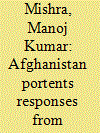

|
|
|
| 2 |
ID:
117110
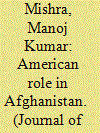

|
|
|
| 3 |
ID:
117109
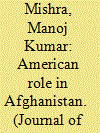

|
|
|
| 4 |
ID:
136283
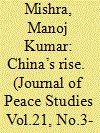

|
|
|
|
|
| Summary/Abstract |
China’s economic growth and military modernization has led to a serious debate in the international community as the weather China would remain an important stakeholder. While many scholars and political leaders in the US saw a threat in China’s rise, Chinese scholars have tried to portray China’s rise as peaceful rise.
|
|
|
|
|
|
|
|
|
|
|
|
|
|
|
|
| 5 |
ID:
174176
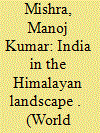

|
|
|
|
|
| Summary/Abstract |
Manoj Kumar Mishra reviews the evolution of India’s policies towards its smaller Himalayan neighbours Nepal and Bhutan. China’s rising profile in the region and growing interaction with all regional states has whetted their appetite for greater independence from Indian influence. New Delhi must be mindful of the sensitivities of the two strategically situated and landlocked former protectorates, which Beijing seeks to involve gradually in its foreign cooperation projects.
|
|
|
|
|
|
|
|
|
|
|
|
|
|
|
|
| 6 |
ID:
175998
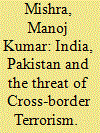

|
|
|
|
|
| Summary/Abstract |
Cross-border terrorism has become a formidable threat to India’s sovereignty with a steep rise in cases of terrorist attacks on the Indian mainland as well as on defence bases and personnel.
|
|
|
|
|
|
|
|
|
|
|
|
|
|
|
|
| 7 |
ID:
138394
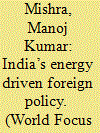

|
|
|
|
|
| Summary/Abstract |
In order to increase its influence in Afghanistan and Central Asia, India entered into agreements on military cooperation with Central Asian states and expressed its willingness to train Afghan army. It entered into strategic partnership agreement with Afghanistan and raised the possibility that it might train the Afghan army after American withdrawal from Afghanistan.
|
|
|
|
|
|
|
|
|
|
|
|
|
|
|
|
| 8 |
ID:
183272
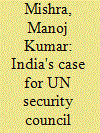

|
|
|
|
|
| Summary/Abstract |
Manoj Kumar Mishra finds that the Covid-19 pandemic, on account of its widespread impact on the questions of stability of polity and economy, has brought non-traditional security concerns to the fore and underlined the need for reforming the UN Security Council in view of the changing security needs of the international community. In its current form and composition, the United Nations Security Council does not sufficiently factor in those concerns which primarily affect the developing countries The anti-colonial struggle, shared platforms such as NAM and the G-77 based on common views and similar socio-economic circumstances have placed India at a favourable vantage point to understand and address non-traditional security concerns on behalf of developing countries.
|
|
|
|
|
|
|
|
|
|
|
|
|
|
|
|
| 9 |
ID:
133567
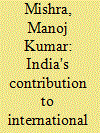

|
|
|
|
|
| Publication |
2014.
|
| Summary/Abstract |
Manoj Kumar Mishra argues that the concept of human security provides a broader framework for a realistic assessment of the contribution of nation-states to international peace and security than human rights. He assesses India's foreign policy as well as its contribution to international peace and security through UN peacekeeping operations and its role in addressing the structural inequalities in the world economic order through the human security perspective
|
|
|
|
|
|
|
|
|
|
|
|
|
|
|
|
| 10 |
ID:
114732
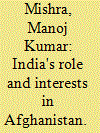

|
|
|
| 11 |
ID:
146707
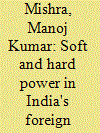

|
|
|
|
|
| Contents |
India adopted soft power as an instrumental tool in its foreign policy approach long before the term was formally conceptualised and became an integral concept in the discipline of international politics in the late 1980s, when Joseph Nye first introduced it to explain the changing dynamics of American foreign policy. The persistence and success of the Non-Aligned Movement in providing an alternative to the power politics of the Cold War era, laid the foundation of India’s soft power. However, New Delhi’s policy towards its South Asian neighbours throughout the Cold War period was marked by a hard power approach driven by security considerations. Although Indian leaders have attempted to build trust and enhance cultural, economic and political interactions with neighbours, especially since the enunciation of the Gujral Doctrine, efforts at accumulating more hard power resources by following a course of multi-alignment at the global level have undercut its soft power resources in the region.
|
|
|
|
|
|
|
|
|
|
|
|
|
|
|
|
| 12 |
ID:
177293
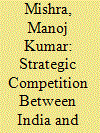

|
|
|
|
|
| Summary/Abstract |
The continuing border clashes and military face-off between the Indian Army and the Chinese People’s Liberation Army (PLA) can no more be viewed merely as the Chinese attempts at redrawing the border between the two rather it is integral to China’s larger claims over the Himalayan landscape.
|
|
|
|
|
|
|
|
|
|
|
|
|
|
|
|
| 13 |
ID:
142939
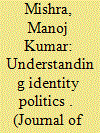

|
|
|